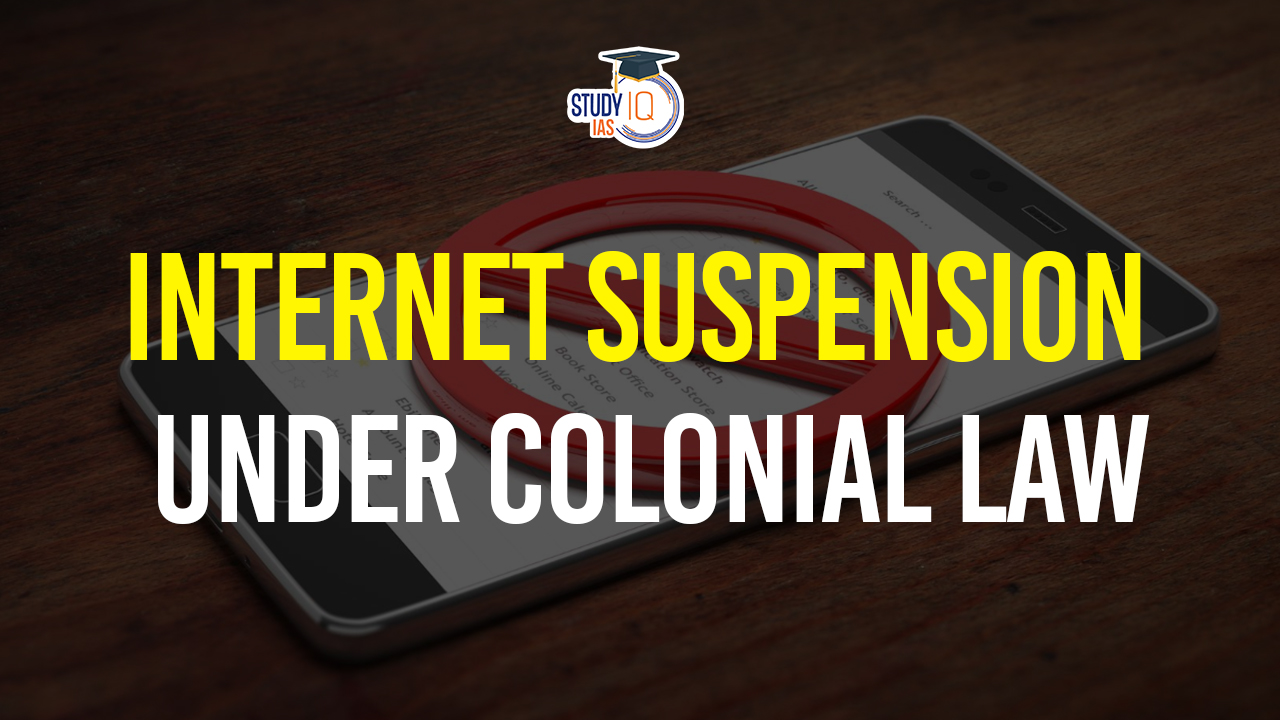Table of Contents
Internet Suspension under Colonial Law
The recent invocation of a British-era act to block internet services in Punjab during the Farm Protests 2.0 highlights the intersection of colonial-era laws and modern governance challenges. The use of the Temporary Suspension of Telecom Services Rules, 2017, and other legal mechanisms for internet shutdowns raises important questions regarding constitutional rights and the balance between public order and individual freedoms.
Mechanisms allowing Internet Shutdowns
- Temporary Suspension of Telecom Services (Public Emergency or Public Safety) Rules, 2017: Under this law, the Home Departments in states, along with state government review committees and the central government (although rarely used), can enforce shutdowns for reasons of public emergency or safety.
- Section 144 of the CrPC: Local law enforcement authorities can enable shutdowns, particularly before 2017, to maintain public order and safety.
- The Indian Telegraph Act, 1885, Section 5(2): The Home Secretary of the Union or state governments can block messaging during a public emergency, safeguarding public safety, or protecting sovereignty and integrity.
We’re now on WhatsApp. Click to Join
Constitutional Provisions for Right to Internet
- Anuradha Bhasin vs. Union of India and Ors. (2020): This landmark judgment recognized access to the internet as a fundamental right under Article 19(1)(a) of the Indian Constitution, which grants the right to freedom of speech and expression, encompassing access to information and the internet.
- Faheema Shirin RK vs. State of Kerala and others (2019): The right to education under Article 21A guarantees education for children aged 6 to 14, where internet access plays a crucial role in modern education.
- K.S. Puttaswamy (Privacy) vs. Union of India (2017): This judgment upheld the fundamental right to privacy under Article 21 of the Constitution, with internet access often used for secure communication.
- Freedom to Practice Any Profession or Carry on Any Trade, Business, or Occupation under Article 19(1)(g): The Anuradha Bhasin judgment also ensures freedom in various professions and businesses, often requiring internet access.
Landmark Precedence: Anuradha Bhasin Judgment (2020)
- The Supreme Court recognized internet access as a fundamental right under the Indian Constitution.
- The Court mandated that any government-imposed internet restrictions must be temporary, limited, lawful, necessary, and proportionate, emphasizing judicial review.
Internet Suspension under Colonial Law- Way Forward
- Review and Reform Colonial-era Laws:
-
- There is a pressing need to review and reform colonial-era laws, such as the Indian Telegraph Act of 1885, to bring them in line with modern constitutional principles and technological advancements.
- The government should consider drafting new legislation specifically tailored to regulate internet shutdowns in a manner that respects fundamental rights and freedoms.
- Strict Adherence to Constitutional Provisions:
-
- Authorities must strictly adhere to the constitutional provisions regarding the right to internet access, freedom of speech and expression, right to education, and right to privacy.
- Any action taken to suspend internet services should be in accordance with the principles outlined in landmark judgments like Anuradha Bhasin vs. Union of India and Ors. (2020), ensuring that restrictions are temporary, limited, lawful, necessary, and proportionate.
- Transparent Decision-making Process:
-
- Governments should adopt a transparent decision-making process regarding internet shutdowns, involving meaningful consultations with relevant stakeholders, including civil society organizations, legal experts, and affected communities.
- Clear criteria and guidelines should be established to determine when and under what circumstances internet shutdowns can be justified, ensuring accountability and oversight.
- Alternative Measures for Public Order:
-
- Instead of resorting to blanket internet shutdowns, authorities should explore alternative measures for maintaining public order and safety during protests or other emergencies.
- Enhanced law enforcement strategies, dialogue with stakeholders, and leveraging technology for targeted interventions can be considered as alternatives to sweeping internet shutdowns.
- Investment in Digital Infrastructure and Access:
-
- Governments should prioritize investment in digital infrastructure and internet access to ensure that all citizens have reliable and affordable access to the internet.
- Promoting digital literacy and bridging the digital divide will empower individuals to fully exercise their rights and participate in democratic processes.
- Judicial Oversight and Review:
-
- Judicial oversight and review mechanisms should be strengthened to provide effective checks and balances on government actions related to internet shutdowns.
- Courts should play an active role in scrutinizing the legality and proportionality of any restrictions imposed on internet access, upholding the rule of law and constitutional principles.
- International Best Practices and Collaboration:
-
- Governments can learn from international best practices and collaborate with other countries, organizations, and experts to develop comprehensive frameworks for regulating internet shutdowns.
- Engaging in multilateral forums and initiatives focused on digital rights and internet governance can facilitate knowledge-sharing and capacity-building efforts.
By implementing these measures, governments can strike a balance between maintaining public order and safeguarding individual freedoms in the digital age, ensuring that internet shutdowns are used as a measure of last resort and in compliance with constitutional principles and human rights standards.


 Miss Universe Winners List From 1952 to ...
Miss Universe Winners List From 1952 to ...
 Significance and History of Diwali Festi...
Significance and History of Diwali Festi...
 Asia Cup Winners List (1984–2025): Ind...
Asia Cup Winners List (1984–2025): Ind...

























